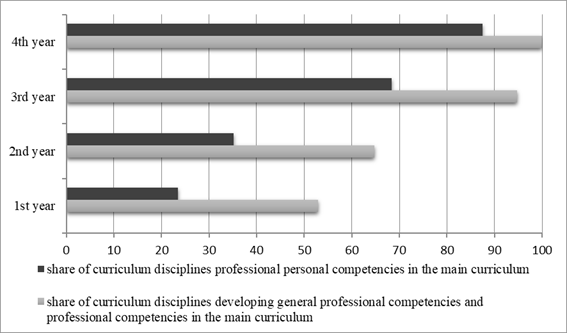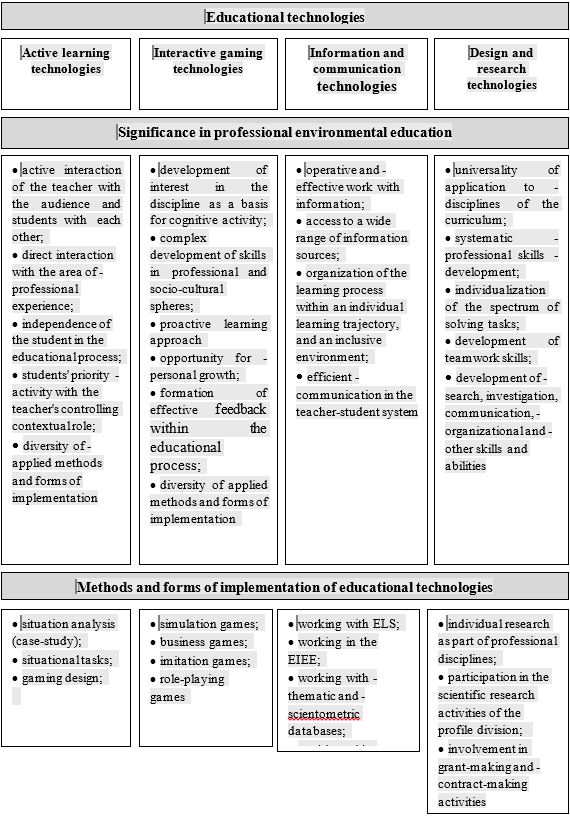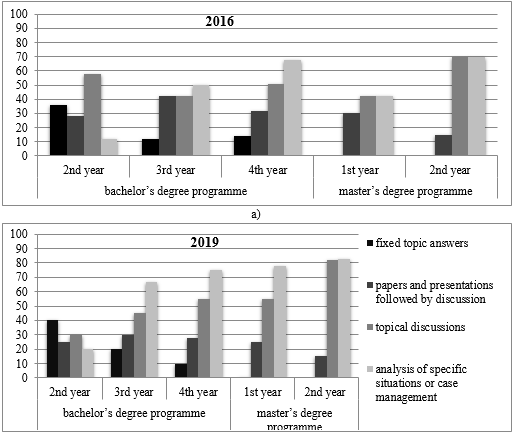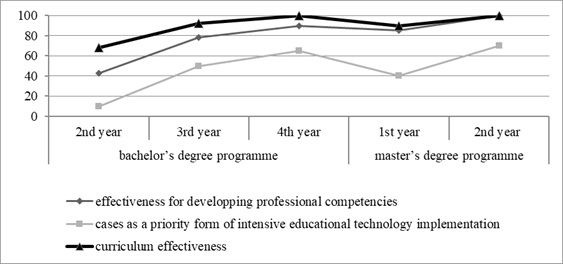Abstract
The article presents analyzing the application of current educational technologies in professional ecological education. The authors considered the mentioned technologies from the perspective of specific application considering the tasks of developing professional competencies and personal qualities of graduates, opinions of the students on the expediency of including innovative approaches to the educational process, the efficiency of mastering the professional disciplines within the curriculum. The study aims to assess the relevance and effectiveness of a set of methods and approaches to current educational technologies to ensure the training of ecologists and nature management specialists in regional universities. It considered the practical aspects of the study in terms of the implementation experience of educational programs for Bachelor's and Master's degrees in Ecology and Nature Management direction at Volgograd State University. The paper discusses various aspects of the implementation of successful experience in applying current educational technologies for the professional training of bachelors and masters in the Department of Ecology and Nature Management. The authors pay special attention to the introduction of design and research technologies in the professional training of ecologists. The effectiveness of professional training students in environmentally-oriented higher education programmes largely depends on the competent choice of educational technologies and their educational integration combined with traditional university methods. The research results revealed a general tendency to increase the importance of active methods in the educational process concerning natural science training in regional higher education institutions and the expediency of their application for developing professional competencies.
Keywords: Active educational methodsbachelor's degreecurrent educational technologiesecological educationhigher educationmaster's degree
Introduction
The state educational standards in the ecological sphere regulate the professional training of specialists and determine the need for a competent approach to the organization of the educational process and the definition of basic and profile content of higher education programs of environmental direction. Developing specific sets of competencies for students depends on the needs of the labor market in each individual professional field. One of the effective tools to improve the quality of implementing basic educational programs is the choice of current educational technologies and methods of their realization. It is all the more important for the university ecological education, because there is a high demand for specialists of this profile on the regional labor market, and the range of their professional competences is constantly expanding.
Practice-oriented disciplines are responsible for the task of mastering applications and acquiring the skills necessary for effective employment, and their share in curricula has increased significantly in recent years. In turn, this determines the increasing importance of active and interactive educational methods in organizing the training process and the expediency of their application to the formation of professional competencies as a current modern trend in higher education (Kholodenko et al., 2018; Stosic et al., 2020; Volkova, 2018). The requirements of the current federal educational standards point to the need for a significant share of the classroom sessions in an interactive form, while maintaining a relatively high share of students' independent work in organizing the educational process. The possibilities of current educational methods and technologies ensure the diversity of achieved educational effects (Averill & Major 2020; Larin et al., 2016) combined with developing intellectual and communication properties of the individual (Shishelova et al., 2019; Solnosky et al., 2020; Van Hanh, 2020).
The spectrum of applied educational technologies and their combinations determines the quality of university vocational education. The practice of higher education now has a fixed concept of "current educational technologies" (Kurbonov, 2018; Larin et al., 2016; Rasulov, 2018; Retivyh, 2015), which implies a set of methods and techniques for organizing cognitive activities of students in higher education programs under the conditions of dynamically changing requirements of the professional environment in modern society, students' needs and transformation of the educational space.
Problem Statement
Volgograd State University has accumulated the successful experience of ecological education in implementing the main educational programs based on FSES HE in the bachelor's and master's training of Ecology and Nature Management directions, which have been implemented for over 10 years.
Application of current educational technologies in modern educational process provides a number of positive results for further professional or scientific activities. The application of such technologies to developing professional competencies (Grineva et al., 2016; Ikryanova, 2018) is particularly relevant in the framework of mastering practice-oriented disciplines. The distribution of disciplines in the main curriculum of the Bachelor's degree program for Ecology and Nature Management direction reflects the trend of increasing practice-oriented disciplines and their prevalence in the 3rd-4th year of study (Figure

Increasing the amount of professionally oriented knowledge, skills and abilities requires an adaptive competency-based approach in choosing educational technologies. Given the high diversity of existing educational technologies (Grineva et al., 2016; Ikryanova, 2018; Kazimova, 2018; Larin et al., 2016; Rasulov, 2018; Volkova, 2018), their diversity and variability of applied methods, each professional area has its own requirements to the result of professional training. The optimal variant for providing the educational process in terms of professional ecology-oriented training on the basis of regional universities includes a combination of technologies: technologies for active learning (intensive technologies), game (interactive) technologies, information and communication technologies, design and research technologies (Kholodenko et al., 2018, p. 48).
Research Questions
Figure

Traditionally, active learning technologies (intensive technologies) were in great demand for higher professional education in such fields of knowledge as economics, law and medicine. However, the variability of used methods and forms of implementation, variety of activities, adaptability and compatibility with traditional educational technologies of higher education have made them popular in environmental education. Implementing the main curriculum of bachelor's and masters' programms of Ecology and Nature Management direction widely used these methods to provide the educational process in such disciplines as "Geoecology", "Environmental Geochemistry", "Ecology of Russia", "Urban Ecology", "Normalization and Reduction of Environmental Pollution, "Technogenic Systems and Environmental Risk", "Environmental Design and Expertise", "Ecological Certification", "Specially Protected Natural Areas" and other disciplines of the professional unit.
Game interactive technologies are also in high demand for teaching environmental students of Volgograd State University, and they are used in the following academic disciplines: "Technogenic systems and environmental risks", "Environmental design expertise", "Ecological education", "Basics of nature management", "Economics of nature use", "Ecological and economic damage", "Environmental protection".
The sources for methodological development within the framework of intensive and game educational technologies implementation include:
the research results of the grant and contract studies;
practical materials used as a basis for bachelor's graduation qualifying papers, the results of research work and research practice as a stage of preparation of master's theses;
materials of reports on field and industrial practices of undergraduate students;
monographs, scientific publications, dissertation abstracts presented in science-metric databases and library collections;
information provided in the public domain on the official websites of relevant ministries and departments, institutions and organizations.
The lecturers of the ecology department have accumulated productive methodical experience of development and application in implementing bachelor and master programs (Ivantsova et al., 2017).
Information and communication technologies are an integral part of the modern system of higher education due to the need to effectively master, analyze and process large volumes of information, which is relevant not only in the professional environment, but in the life of modern society as a whole (Volkova, 2018, p. 609). Students of Volgograd State University have permanent access to electronic library systems "Znanium.com", "BOOK.ru", "Lan", "Yureit", polythematic reference-bibliographic and scientometric databases of Web of Science and Scopus, as well as use the electronic information and educational environment (EIOS) of Volgograd State University (m.volsu.ru) in the learning process. Environmental students use special software for a number of disciplines in the professional unit. In particular, while mastering the disciplines of the professional unit, students acquire skills of working with ArcGIS 10.3, Surfer, Global Mapper package; "Environmental Protection" program based on 1C: Enterprise, specialized automated system of electronic reporting and calculation of ecological payments "Nature Manager Module" (in the mode of free access on the official website of the Federal Service for Supervision of Natural Resources Management of the Russian Federation).
Design and research technologies have now received a new round of development in professional higher education. Their main advantage is to acquire skills in research and professionally oriented tasks, including the use of knowledge-intensive equipment (Shishelova et al., 2019). The forms of application of these technologies depend on the specifics of educational and research activities of higher education institutions. At Volgograd State University this educational technology follows three key scenarios. The first variant focuses mainly on the students of the courses and assumes their involvement in the work within the framework of grant and contractual activities of the specialized subdivisions, such as the Department of Ecology and Nature Management and the Institute of Natural Sciences graduating for ecologists. The second scenario includes the formation of research groups "scientific supervisor - graduate students - master - bachelor" in the framework of implementing the research topics of the department. Currently, the key area of research for the Department of Ecology and Nature Management is ecological monitoring and environmental quality assessment of regional systems and Volgograd. The third scenario involves the research work of students in 2-4 years of bachelor's and master's degree programs in the sequential mastering of the disciplines within the professional unit with the possibility of an individual educational path, which ends with the preparation of a bachelor's final qualifying work or a master's thesis. The specificity of project activity technologies is that they are more focused on the development of cross-cutting competencies that is not related to a particular discipline and requiers systematic mastering of the entire curriculum within developing general professional and professional competencies.
Purpose of the Study
The study aims to assess the relevance and effectiveness of a set of methods and approaches to current educational technologies to ensure the training of ecologists and nature management specialists in regional universities.
Research Methods
When assessing the effectiveness of applying current methods and technologies in the professional training of bachelors and masters in the field of ecology and nature management, it is possible to identify several key aspects: the supply of disciplines of the curriculum with educational and methodical developments with intensive, game interactive, information and communication technologies; the demand for up-to-date technologies by students of ecology-oriented higher education programmes; the efficiency of mastering the disciplines of the professional unit used various methods and forms of intensive and interactive educational technologies.
Findings
In total volume of methodical support of disciplines the role of current educational technologies increases from 13,5 % on 1 year of training to 35 % on 4 year in the bachelor degree, in a magistracy such share makes about 40 % on 1 year and about 60 % on 2 year. Table
The analysis of the share of certain current educational technologies in providing professional disciplines under Bachelor's and Master's degree programs of Ecology and Nature Management direction confirmed the high share of active learning technologies (78% for Bachelor's and 62% for Master's degree). In terms of involvement in providing the educational process the second place was occupied by interactive game technologies (17% for bachelors and 33% for masters). Information and communications technology has a relatively low profile (5% in both cases).
The feedback of students periodically implemented through a sociological survey helped to assess the effectiveness of including intensive and interactive technologies in the educational process. Volgograd State University conducted a sociological survey of students' satisfaction with the quality of the educational process in 2016 and 2019. The research was targeted at a contingent of students at the Department of Ecology and Nature Management of bachelor's and master's degree students from 2-4 years. In 2016, the survey involved a total of 114 students, of whom 96 were bachelor's and 18 master's students; in 2019, the total number of respondents was 87, including 62 bachelor's and 25 master's students. The sample representativeness was 68% in 2016 and 72% in 2019. The analysis of 2019 results confirmed a number of facts and trends obtained in the analysis of 2016 results (Kholodenko et al., 2018, pp. 48-49). In particular, 89-91% of respondents noted the fact of intensive and interactive technologies in the educational process when studying at the bachelor's degree for 51.6% of the total number of disciplines of the curriculum, in the master's degree - more than 65% of disciplines. The absolute majority of the respondents (more than 98%) noted the effectiveness of these technologies in mastering academic disciplines, with more than 80% of bachelor's students and more than 93% of master's students noting the importance for developing professional skills and abilities. Students also noted the importance of skills acquired in the educational process for future professional activity. At the same time, the average score reflects the opinion mainly of 2-3 year bachelor students (about 55-59% and 75-81%, respectively), high - of 4 year bachelor students (more than 60-65%) and 1-2 year master students (55-65% and 85-87%, respectively). This trend is quite expectable, since the development of professional skills is connected with the mastering of professional disciplines, concentrated on the final bachelor's program year and forming the basis of the curriculum at the master's level (Figure
The intensive and game interactive technologies in the practical training organization are more preferable for bachelor's students starting from the 3rd year of study and continue for the whole period of master's studies. Cases are the most popular form of implementation among students (Figure


The effectiveness analysis of practice-oriented approaches in education is based on the results of students' performance in specific disciplines of the curriculum (Kholodenko et al., 2018, p. 50), including consideration of the productivity of their work on tasks developed with active and game-based educational technologies. Such analysis used the example of a number of professional disciplines of main curricula for 05.03.06 and 05.04.06, Ecology and Nature management direction at Volgograd State University in the framework of the 2nd stage of the RFBR and Volgograd region Administration grant implementation (project No.16-16-34008, 2016-2017). The analysis selected disciplines with a long-term (more than 5 years) practice of applying current educational methods and technologies, thus allowing to evaluate their effectiveness in dynamics. Concerning the selected disciplines, we considered the final assessment of the discipline, which remained stable in the range of 71-100 points during 3 years of their implementation, with a 100-point scale of assessing discipline development. All the disciplines showed steady positive academic performance (the share of students with 71-100 points per discipline was at least 50%) (Kholodenko et al., 2018, pp. 49-50).
Conclusion
Analysis of the survey participants' opinion and assessment of the efficiency of mastering the curriculum disciplines confirms two important facts: firstly, the recognition of the importance of intensive and game technologies in the educational process and, secondly, their important role in developing professional competencies.
Thus, we can note the overall effectiveness of the application of intensive and interactive technologies in professional ecological education based on the set of analyzed parameters.
We also revealed the students' readiness to effectively implement practice-oriented projects as part of the educational process. This is especially relevant for master's students, who have already mastered most of the general professional competencies during their studies and have formed certain skills of systematization, evaluation and analysis of the obtained information, organization of research activities and teamwork.
References
- Averill, R. M., & Major, J. (2020). What motivates higher education educators to innovate? exploring competence, autonomy, and relatedness–and connections with wellbeing. Educational Research, 62(2), 146-161. https://doi.org/10.1080/00131881.2020.1755877
- Grineva, Е. А., Bibikova, N. V., Davletshina, L. H., & Eremina, L. I. (2016). The role of creative technologies in environmental education of young people. Pedagogical education and science, 1, 141–144.
- Ikryanova, D. V. (2018). Pedagogical means, forms and types of innovative teaching technologies in higher education institutions. Alleja nauki, 22(6), 928-930.
- Ivantsova, Е. А., Polovinkina, Yu. S., Kholodenko, A. V., Zaliznyak, Е. А., Matveeva, А. А., & Manaenkov, I. V. (2017). Ecology and environmental management: workshop. Volgograd State University Publishing.
- Kazimova, G. H. (2018). Use of innovative pedagogical technologies for training modern specialists. Problems of Pedagogy, 34(2), 14-16.
- Kholodenko, A. V., Polovinkina, Yu. S., Manaenkov, I. V., & Zaliznyak, Е. А. (2018). Analysis of the effectiveness of actual methods and technologies in professional environmental education. Regional education: current trends, 34(1), 46-53.
- Kurbonov, А. М. (2018). The role of modern pedagogical and innovative technologies in education. Achievements of Scientific and educational, 27(5), 69-71.
- Larin, S. N., Stebenyaeva, T. V., & Lazareva, L. Yu. (2016). The use of modern pedagogical technologies, forms and methods of organizing the educational process in higher education institutions. In Theoretical and practical aspects of psychology and pedagogy (pp. 103–127). Ufa Publishing House "Aeterna".
- Rasulov, H. A. (2018). Problems of implementing innovative technologies in teaching practice. Science and education today, 27(4), 62-63. https://www.elibrary.ru/contents.asp?id=34840743&selid=32733710
- Retivyh, М. V. (2015). Innovative technologies of higher education: conceptual foundations, pedagogical tools, forms and types. The Bryansk State University Herald, 1, 61–65.
- Shishelova, T. I., Pavlova, Т. О., & Chuvashova, N. F. (2019). Project method in the implementation of the plan for sustainable development of Russia. https://www.elibrary.ru/item.asp?id=37031969
- Solnosky, R., Parfitt, M. K., Holland, R., & Ling, M. (2020). Integrative multidisciplinary architectural engineering capstone with a student-centered team approach to open-ended projects. Journal of Architectural Engineering, 26(3). https://doi.org/10.1061/(ASCE)AE.1943-5568.0000413
- Stosic, L., Dermendzhieva, S., & Tomczyk, L. (2020). Information and communication technologies as a source of education. World Journal on Educational Technology: Current Issues, 12(2), 128-135. https://doi.org/10.18844/wjet.v12i2.4815
- Van Hanh, N. (2020). The real value of experiential learning project through contest in engineering design course: A descriptive study of students' perspective. International Journal of Mechanical Engineering Education, 48(3), 221-240. https://doi.org/10.1177/0306419018812659
- Volkova, Е. А. (2018). Innovative pedagogical technologies and their implementation based on the convergence of science and information and communication technologies. Synergy of Sciences, 26, 607-611.
Copyright information

This work is licensed under a Creative Commons Attribution-NonCommercial-NoDerivatives 4.0 International License.
About this article
Publication Date
28 December 2020
Article Doi
eBook ISBN
978-1-80296-098-3
Publisher
European Publisher
Volume
99
Print ISBN (optional)
-
Edition Number
1st Edition
Pages
1-1040
Subjects
Multicultural context, learning environment, modern society, personality formation, informatization of the society, economics and law system of the region
Cite this article as:
Kholodenko, A. V., Ivantsova, E. A., Matveeva, A. A., & Zaliznyak, E. A. (2020). Application Of Relevant Educational Technologies In Training Ecologists At Regional Universities. In N. L. Shamne, S. Cindori, E. Y. Malushko, O. Larouk, & V. G. Lizunkov (Eds.), Individual and Society in the Modern Geopolitical Environment, vol 99. European Proceedings of Social and Behavioural Sciences (pp. 376-385). European Publisher. https://doi.org/10.15405/epsbs.2020.12.04.44

